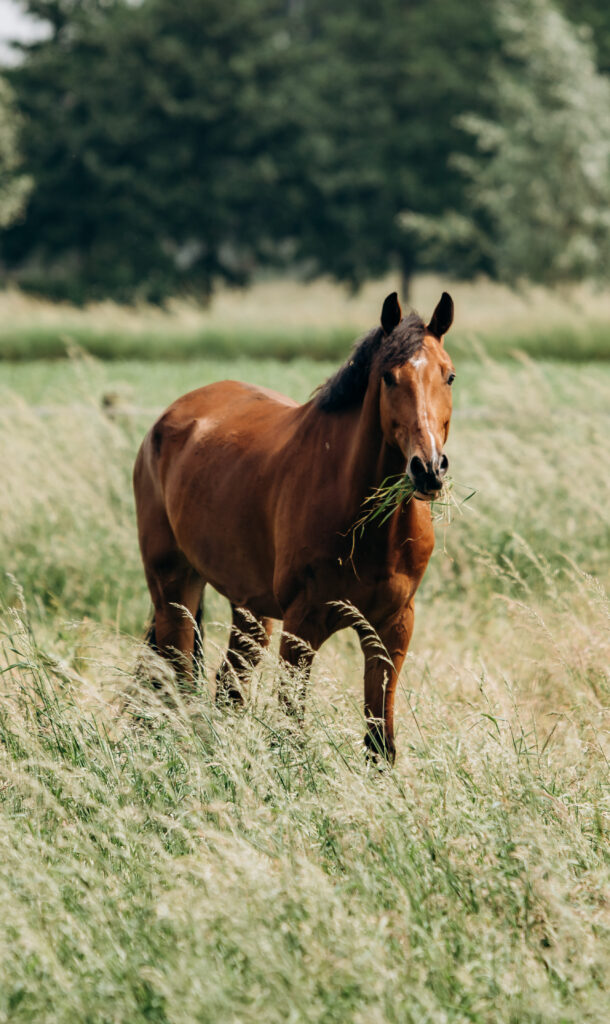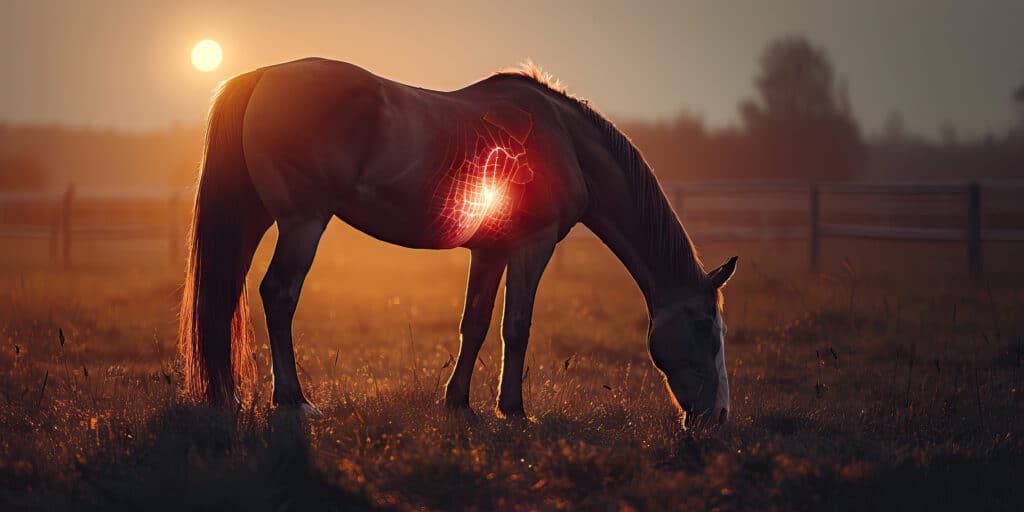Feeding, Hi form, supplements
DO UNKNOWN INGREDIENTS + MARKETING MAGIC = UNICORN’S FREE OF ULCERS?
We have been closely following the unfolding and frankly riveting story of Ponease, the so-called magical elixir for ulcers. It’s truly frightening to see how people have been influenced by Facebook groups and fake reviews left on multiple Facebook pages. This should be a lesson to us all, but I fear it won’t be, given the desperation people feel to find a solution for the scourge of ulcers.
Equine ulcers (EGUS) are normally attributable to three things, incorrect feeding, stress or pain or a combination of the three which is very often the case. I feel people’s pain but there are no mystical magical cures out there, just common sense and a good look at yourself to see what you are doing and what needs to be changed.
THE FIRST ESSENTIAL STEP is make sure that your horse has the ability to eat 24/7. Our horses are trickle feeders and have evolved to eat when they want and not on our clocks. Yes that means even at 3 or 4 o’clock in the morning should he or she wish. We hear the word ad lib hay but unfortunately that does not mean the same thing to all people. It means when we go in first thing in the morning that they still have plenty of hay left in their feeder or hay net. In our view this is a cardinal rule and should never ever be broken – but we know that it is. No ability to eat brings on stress = ULCERS
THE SECOND ESSENTIAL STEP is ensuring that a horse is eating what it has evolved to eat over millions of years involves understanding its natural diet and how it has been shaped by evolution. Horses are strict herbivores that have evolved to graze on grasses and other vegetation for most of the day. Here are some key points to consider: to ensure that your horse is eating what it has evolved to eat over millions of years.

1.Natural Diet:
-
- Grasses and Forage: Horses have evolved to primarily eat grasses. Their digestive systems are designed to process high-fibre, low-starch diets.
- Continuous Grazing: In the wild, horses graze for many hours a day, which helps maintain their digestive health and prevent issues like colic or gastric ulcers.
- Variety of Vegetation: Wild horses also consume a variety of plants, which can provide different nutrients and help balance their diet.
2.Digestive System:
-
- Hindgut Fermenters: Horses ferment fibre in their large intestine and cecum, which is essential for extracting nutrients from their forage-based diet.
- Constant Chewing: Chewing forage produces saliva, which helps buffer stomach acid and aids in digestion.
Will Rawlin was convinced to feed naturally nearly three years ago.
“As an eventer, we travel a lot, with our horses going from one end of the country to the other and abroad! I am often questioned about my way of feeding, with concerns that my horses wouldn’t have enough energy. Well, we certainly put that one to bed with William’s amazing first outing at Badminton. In fact, his clarity of thinking at the Eyelashes helped me out of a sticky place. I know that their digestive systems are in excellent condition; it is just one less worry for me.”
3.Modern Feeding Practices:
-
- Commercial Feeds: While commercial feeds are convenient, they are often higher in starch and sugar than a horse’s natural diet and use many waste products GM Soya Hulls/Husks, Wheatfeed, Distillers Grains as a few examples.
- Supplements: Supplements can be necessary but should not replace the bulk of a horse’s diet, which should be forage-based.
4.Evolutionary Perspective:
-
- Slow Adaptation: Evolutionary changes occur over long periods, and the fundamental dietary needs of horses have remained consistent. Rapid changes in diet, such as those introduced by modern feed companies, can lead to health issues.
- Basic Darwinian Principle: As per Darwin’s theory of evolution, significant adaptations in a species’ dietary needs take much longer than the relatively short period humans have been producing commercial horse feeds.
5.Practical Recommendations:
-
- Prioritize Forage: Ensure that the bulk of your horse’s diet consists of high-quality forage, such as grass hay or pasture.
- Monitor Health: Regularly check your horse for signs of digestive health issues and consult with a nutritionists who understands these basic principles to tailor their diet to their specific needs.
- Natural Grazing: Whenever possible, allow your horse to graze naturally, which aligns with their evolutionary dietary habits.
- Supplement With high quality, human grade products free from fillers that only utilise ingredients aligned to an equine’s natural herbivorous diet.
By focusing on a diet that closely mimics what horses have evolved to eat, you can support their health and well-being, leveraging millions of years of evolutionary adaptation.
If you’re saying, “But we have ulcers now,” we would respond: No problem.

Begin transitioning to a natural feeding regime immediately. Simply switching from one commercial horse feed to another is like swirling the drain; a glance at ingredient lists shows they mostly use the same waste product ingredients, differing only in protein, fibre, sugar, and starch levels.
You may need some veterinary assistance to coat the ulcers for short-term healing.
THE THIRD ESSENTIAL STEP is to work with a supplement company that truly understands. Our horses need to be correctly balanced, providing them daily with the nutrients they require to be healthy in a format that they can readily absorb and utilise.
Just remember our horses once were free to roam, they are master foragers but they can no longer roam so we need to provide them with the nutrients they require to ensure a healthy, fully functioning gut microbiome.
Tom Woodward emphasises the importance of natural feeding and appropriate supplementation for his horses.
“I had a case recently where a horse, known for internal stress, was undergoing veterinary diagnostic examinations. The vet performed an endoscopic examination as part of the process and found the horse’s stomach to be exceptionally healthy. This outcome totally supports my belief that feeding horses in a natural manner, tailored to their species-specific needs, is the best approach.”
Many companies tout “natural” ingredients, but that can be misleading. It’s more than just having natural ingredients—a tomato is natural, but a horse wouldn’t eat it unless starving, and a coconut? My horse doesn’t know how to open one to get the white meat out.
We also see liquid-based solutions, but look closely at the analysis and you’ll often find moisture content (water) exceeding 90%. How much does a litre of water cost?
Yes, we are biased, having been in the business for over 30 years. Originating from Australia, we have access to some of the world’s greatest, cleanest ingredients. More importantly, we use powerful extracts to ensure the efficacy of our supplements. They are more expensive, but they are not filled with linseed, alfalfa meal, whey protein, and other ingredients foreign to our equines.
SO NO WE DO NOT BELIEVE THAT UNKNOWN INGREDIENTS + MARKETING MAGIC CREATES UNICORNS FREE FROM ULCERS.
So, if you’ve read this and realize that rather than continuing to swap manufacturers’ feed bags and dubious supplements, resulting in the same outcomes time and again, this approach may help you embark on a new path for your horses, enhancing their happiness, comfort, and longevity

Kathy Staples knew she needed to make a change to her horse’s feeding, but knowing and actually doing it are two entirely separate matters.
“I finally took the plunge working with the guys at Hi Form. As I am in charge of feeding, I didn’t even tell Brook. He found out when he asked me what I had done with the horses, as they were going so much better. That was two years ago. Would I go back? The answer is a definite no.”

